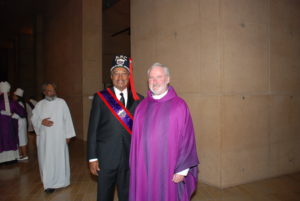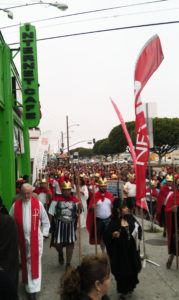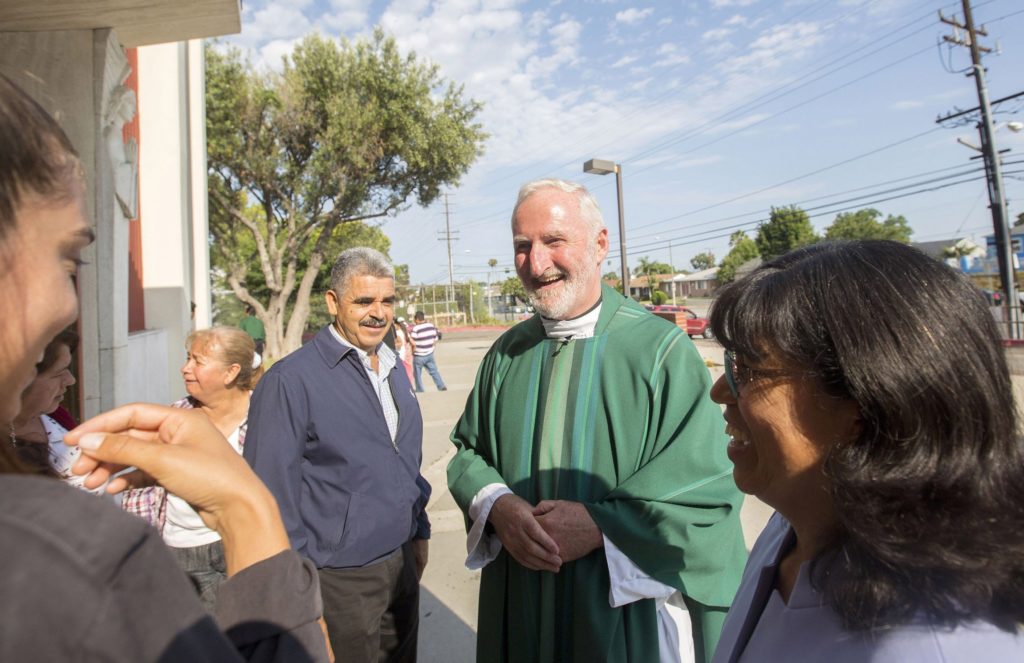This story is part of a series featured in a commemorative issue honoring Bishop David O'Connell. Read more stories at the Bishop Dave Commemorative Issue web page.
Father David O’Connell first arrived in Southern California as a newly ordained priest from Ireland in the summer of 1979. He was looking forward, like many newcomers to the region, to visiting Hollywood. But he wasn’t sure how to get there.
So, one day while in South LA, he approached a woman and politely declared, “I’m new to the area. Is Hollywood close by?”
The woman looked at him, smiled and said, “No, honey, you’re in Watts. We’re a long way from Hollywood.”
It was ironic, then, that O’Connell went on to find unparalleled joy as a priest serving the people and parishes of South Los Angeles, a world apart from the glamor of Hollywood.
Catholics who spent time with O’Connell in South Los Angeles — notably Deanery 16, where the future bishop served for nearly 30 years as a pastor in different parishes — remember O’Connell as a leader, friend, and brother who knew how to reach people at the parish and in the streets.
“Bishop Dave was always there for us,” said Anderson Shaw, director of the African American Catholic Center for Evangelization. “He stood in the gap to help us, he knew how to get the help we needed. He counseled us, prayed with us, prayed for us — and now we pray for him.”

From 1988 to 2003, Msgr. O’Connell served as pastor of twinned parishes St. Frances X. Cabrini Church (on Imperial Highway near Normandie) and Ascension Church (at Figueroa and 112th Street). He then moved north to pastor at St. Michael Church (at Manchester and Vermont) from 2003 to 2015, and concurrently for a time as pastor of nearby St. Eugene Church (on Haas near Van Ness).
His time at St. Frances coincided with the lead-up to and aftermath of the 1992 LA Riots, which left entire city blocks in South Central destroyed and brought tensions between various ethnic communities and law enforcement at a breaking point. He and other religious leaders would organize meetings with police and sheriff’s deputies in people’s homes so that frustrations could be aired and wrongs be forgiven.
O’Connell’s presence in South LA led to his involvement in OneLA, a local community organizing network that brought together leaders from various faith traditions and nonprofits. In a statement released after his death, OneLA said O’Connell’s early work on the South Central Organizing Committee (SCOC) “addressed gun violence, historic disinvestment … poverty, and the plight of undocumented immigrants.” His work also “led to the passage of California’s assault weapons ban in 1989, helped thousands of immigrants become citizens after the 1986 Immigration Reform and Control Act passed during the Reagan administration, and shut down liquor stores in the wake of the riots following the Rodney King beating.”
Among those he worked with were longtime Congresswoman Maxine Waters and future LA Mayor Karen Bass, then co-founder of Community Coalition, an organization founded to improve social and economic conditions in South Los Angeles.
“The metaphor I used is, he built bridges between broken hearts,” said Father Stanley Bosch of the Missionary Servants of the Most Holy Trinity.
Bosch was a pastor in Compton when he first met O’Connell in the 1990s during their work with OneLA. Even though O’Connell was looking after two parishes, he would offer to help cover Masses for Bosch, who was often called out to homicides and other emergencies in the inner city as part of his gang intervention work.
“I was moved by that,” Bosch said.
Years later, as Bosch moved into full-time gang intervention and clinical therapy work, O’Connell invited him to live in the rectory at St. Michael. Bosch was amazed to see O’Connell leading contemplative prayer sessions for at-risk youths before school in the morning.
“He did what he’d do so beautifully: just invite Jesus and hold him where he breathes into your heart; and to hold that little child that’s inside them that might be wounded,” recalled Bosch.
Los Angeles priest Father Jonathon Meyer spent a year with O’Connell at St. Michael as a seminarian intern in 2012. He remembered the line of people he’d find in the parish office waiting to speak with O’Connell. There were a few times he was asked to be in the meetings.
“It was listening to their story, and then teaching them how to pray,” said Meyer, who is currently studying moral theology in Rome but flew to LA for the slain bishop’s funeral services.
Other times O’Connell would help parishioners — often out of his own pocket — in need of food, clothing, or even rent money, Meyer remembered. “I remember doing some furniture runs,” he admitted. “He never really turned anyone away.”

Before arriving at St. Frances in 1989, O’Connell spent several months in Mexico learning Spanish to prepare to minister to the parish’s growing Hispanic community. Over the years, he grew in devotion to Our Lady of Guadalupe, who would help him evangelize in unexpected ways.
Vivian Alvarez remembered how, in 1999, a neighbor who was a parishioner at St. Frances asked if their home could give “posada,” or welcome, for nine days to a traveling image of Our Lady of Guadalupe that had been sent out by Father O’Connell. The offer came at an “opportune moment, when our marriage was falling apart,” remembered Alvarez.
“He sent Our Lady to our home to heal our homes, and thanks be to God for that visit,” said Alvarez, who came to O’Connell’s public viewing at the Cathedral of Our Lady of the Angels March 2. “It saved our marriage.”
“He never knew that his ministry impacted our family and provided that space for healing,” said Alvarez’s daughter Claudia.
St. Frances parishioner Maria Cruz was invited by O’Connell to help with catechism classes at a time when gang violence had the neighborhood on edge. One day, she went to the church frantically to tell O’Connell that her husband was in the hospital after being shot on the street.
“I thought that Father hadn’t understood me,” said Cruz.
Days later, her husband confirmed the opposite, recounting with awe how he had awoken in his hospital room to find the priest on his knees at his bedside, begging God for his life.
“He never left us alone, he wanted our children to have a better future,” said Cruz. “For me he was a saint on earth.”
At St. Eugene, Shaw said parishioners found O’Connell to be “an easy person to work with.”
“He was always more concerned with how we were doing and what he could do to help, rather than nitpicking and micromanaging everything we were working on,” said Shaw. “He respected the gifts and abilities of others.”
Looking back, Bosch believes his old friend’s time in South LA made O’Connell the candidate to become “the perfect bishop.”
“We understood it’s not just about the four walls [of the church],” said Bosch. “It’s about being out in the neighborhood and in the presence of Jesus.
“We would sector off the whole parish at St. Michael’s and have small groups in the neighborhoods — especially in the apartments, which are the most difficult parts of South LA because the people living there don’t own them, and there is more violence there.”
Alice Thomas, a St. Frances parishioner and grand lady of the local Knights of Peter Claver Auxiliary Council, has fond memories of cooking for O’Connell (“steak and salad”) and including him in Knights of Peter Claver activities.
“We never had any arguments or any kind of discord,” she said of O’Connell, who was himself a knight in the fraternal order founded by Black Catholics. “Father Dave made no distinction among people, regardless of their race or background or anything else. He was everyone’s priest and everyone’s friend.”
Tom Hoffarth also contributed to this story.

